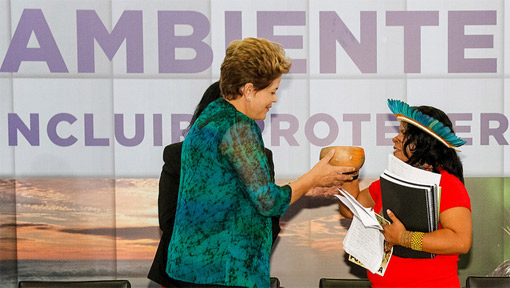All eyes are on Brazil this week as more than 130 world leaders and some 50,000 activists, civil society representatives and business leaders are attending the UN Conference on Sustainable Development, known as Rio+20, in Rio de Janeiro.
The conference marks 20 years since the Earth Summit in 1992 concluded, when leaders—optimistic about a post-Cold War multilateralism—agreed to ambitious conventions on climate change and biodiversity, including the heralded UN Framework Convention on Climate Change (UNFCC) (UNFCCC).
Today, things are a little different. The worldwide financial crisis has cast a pall over the conference, and leaders of some of the most industrialized countries—David Cameron of the United Kingdom, Angela Merkel of Germany, Barack Obama of the U.S.—are notable at Rio+20 only by their absence.
Expectations are low. In an interview for this article, a Brazilian Environment Ministry official noted, “People here don’t believe that leaders are interested in agreements which would steer their countries to a big change, especially in a moment of financial crisis.”
The Brazilian government acknowledged that economic woes could hamper negotiations, but insisted it will not render Rio+20 a failure. “We must remember that 20 years ago, there was a crisis affecting the developing world,” Foreign Minister Antônio Patriota asserted.
Still, an environmental agenda is not a top priority in today’s political atmosphere. Economic growth is always a prime concern for politicians seeking re-election; in this fiscal climate it is a requisite. In short, development might be an easy sell—but sustainable development, not so much.
What, then, can the world expect from Rio+20?
An editorial in Folha earlier this month suggested the summit would yield no meaningful treaties. Rather, “the final document will probably be an anodyne declaration about green economy, more a slogan than a real concern.”
The “green economy” is one of Rio+20’s two stated agendas; the other is creating “a framework for sustainable development.”
Certainly the focus on the private sector is a departure from 1992. Back then, business was marked as the cause of the problem; this year it is being heralded as a possible solution.
For Marina Silva, environment minister from 2003 to 2008 under then-President Lula da Silva, discussion about the green economy is peripheral in importance and will allow more fundamental environmental threats to be sidelined.
Speaking at TEDxRio+20 earlier this month, Silva said, “[Brazil] has reduced the debate to a discussion of economics, social development and governance, separated from ecological and environmental systems.” In contrast, “Rio ’92 was guided by science and international public opinion, [and produced] three major conventions on climate change, desertification and biodiversity.”
Of course, despite those conventions, the state of the environment has unquestionably deteriorated since the UNFCCC was adopted. The period between 2000 and 2009 was the warmest on record. In 1992, the atmosphere held fewer than 360 parts per million (ppm) of carbon dioxide; today the concentration is approaching 400 ppm. Meanwhile, loss of habitat is pushing species to the brink of extinction at an alarming rate. The newest version of the International Union for Conservation of Nature’s Red List puts 19,817 of 63,837 species at risk of dying out, including 41 percent of amphibian species, 33 percent of reef-building corals, 25 percent of mammals, and 13 percent of birds.
Shining the Spotlight on the Host Country
The outlook might be gloomy, but host Brazil should be proud. Deforestation is at its lowest rate in 23 years, down an extraordinary 78 percent from its 2004 peak. (Folha, however, argues that President Dilma Rousseff is “harvesting the fruits” of anti-deforestation policies implemented by Minister Silva.
Although Brazil has made huge offshore oil discoveries in recent years, the country uses little dirty energy. The share of renewable electricity production in Brazil grew to 88.8 percent in 2011, compared to 19.5 percent worldwide.
At the state level and below, Brazil is host to innovative efforts to reduce deforestation while increasing incomes. For example, the Programa Bolsa Floresta (Forest Assistance Program) in the state of Amazonas, provides money and health care for locals who help protect the forest. Today the program works with more than 8,000 families in areas totaling 10 million hectares (24.7 million acres).
Yet Brazil’s recent environmental policies have angered many. The government’s fidelity to hydropower has come at the expense of Indigenous groups and wildlife, drawing considerable international ire. The Belo Monte dam—projected to be the world’s third largest—is currently under construction in the Indigenous-heavy state of Pará and is casting an unwelcome shadow over Brazil’s hosting duties.
Another issue likely to cause an outcry is approaching: In July, Brazil’s Congress will vote on a bill to open some Indigenous reserves to mining.
Even employees of the Environment Ministry have expressed their dissatisfaction with the government. At a rally on June 21 in Rio, workers from Instituto Brasileiro do Meio Ambiente e dos Recursos Naturais Renovavéis (Brazilian Institute of the Environment and Renewable Natural Resources—IBAMA), the environmental protection agency, and the Chico Mendes Institute for Biodiversity Conservation told Jornal do Brasil that the government’s apparent concern at environmental issues is inconsistent with its practice. They claimed that there is an increasing devaluation of their work, a relaxation of environmental legislation and a disregard for the social and environmental impacts of major works.
Most recently, Congress passed a hotly debated new Forest Code, which sought to change laws about land use and forest protection. It pitted ruralistas against environmentalists—development against preservation—in a fight that went to the very heart of the divisive issues underlying Rio+20. Dilma settled on a compromise, keeping much of the bill but vetoing some clauses, including one granting amnesty to large landowners for deforestation that took place before July 2008.
Dilma understands the power of making concessions in the interest of appearing green. Last week she announced that she would set aside seven new territories in the Amazon for Indigenous lands and two regions totaling 450 square kilometers (174 square miles) as conservation areas.
Folha said this was mere window dressing compared to Lula’s total of 264,000 square kilometers (101,930 square miles), but there are other signs that the anticipation of Rio+20 has wrought changes in a power balance hitherto often dominated by agricultural interests. Last Monday, for example, Dilma summarily told the Minister of Agriculture she would make no more decisions regarding the Forest Code until after Rio+20.
The implication is clear: the president is unwilling to jeopardize her green credentials on the eve of the summit. This is a good sign. If Dilma is willing to step forward and set a dynamic tone, a productive summit may be possible after all.
Tangible Outcomes, Reputation Implications
According to Eduardo Felipe Matias, an environmental lawyer and author, a possible result of Rio+20 would be Sustainable Development Goals—concrete targets in areas like renewable energy and water usage. “Although we do not have time to set all these goals in detail during the Conference,” he told Revista Época, adding, “if countries show a strong desire to establish them in the near future—some say 2015—that would be at least an important symbolic step forward.”
Others believe that the best of the summit will be at its borders. There are more than a thousand parallel events, and a real sense of excitement about the Cúpula dos Povos (People’s Summit). As we have seen in Brazil, small-scale efforts can be very effective.
Finally, there is a sense among some observers that the summit could serve as a sort of coming-out party for Brazil. Brazil’s dedication to hydropower and biofuels was not an eco-minded decision but a pragmatic one, driven by sugar and ethanol interests, and enviable national water resources.
“Yet today Brazil has come to see the advantages of embracing a position of pro-biodiversity, pro-climate change control and pro-renewable energy,” remarked a colleague in resource management.
“Brazilian leaders speak openly of aspiring to be the world’s first environmental superpower. To see how these interests coincide with their geopolitical interests should not diminish their credibility but rather suggest that they may have compelling reasons to stay on this path.”
With Cameron, Merkel and Obama as no-shows, could this be Brazil’s chance to lead?








